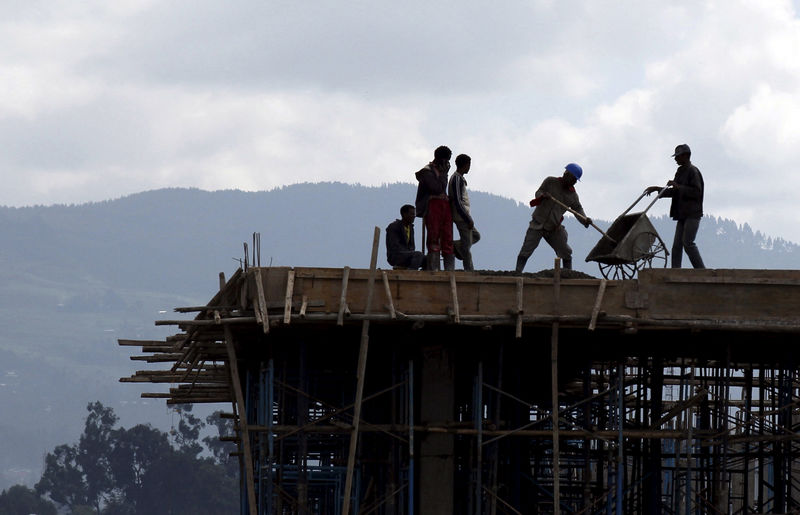By Claire Milhench
LONDON (Reuters) - Africa, famously short of new roads, ports and power stations, is increasingly leaning on its own sovereign investment funds to help fix its infrastructure gap.
The funds - which have around $150 billion between them, according to research firm Preqin - are digging in themselves and offering co-investment opportunities and guarantees to attract foreign capital.
The scale of the problem is huge - some 600 million Africans, or half the continent's population, still lack reliable power, according to a panel discussion at last week's World Economic Forum in Davos.
Meanwhile, consultancy McKinsey has estimated that investment in African infrastructure is so poor it needs to double to $150 billion a year.
But while investors worldwide are queuing up to finance planned overhauls of transport and energy infrastructure in the West - part of a global search for returns - they have largely bypassed Africa, still considered the preserve of development agencies or specialist funds.
Africa is still viewed in some circles as a difficult investment, hampered by corruption, war and political risk.
Now home-grown sovereign wealth funds are seeking to change this perception and kick-start projects themselves.
Morocco's $1.8 billion Ithmar Capital state fund, for example, is seeking to raise $1 billion-$2 billion from infrastructure specialists and other sovereign funds for its Africa green infrastructure fund. This will focus on clean energy and water projects and is co-sponsored by the World Bank.
"Energy is probably the biggest impediment to the development of the continent," said Tarik Senhaji, Ithmar's chief executive, said. "The energy cost is so high you can't develop anything else.
"A lot of the sovereign funds and pension funds we are speaking to are extremely interested in infrastructure - the question is how do you bring the risk perception of Africa down so they can co-invest with us?" Senhaji said.
It is early days. Last year three Africa-focused infrastructure funds raised $665 million, according to Preqin – just one percent of the total $61.2 billion raised by 54 infrastructure funds globally.
Yet the 15-20 percent returns on offer in Africa are higher than the 8-12 percent offered in developed markets.
"If people haven't invested in the region before, they probably perceive more risk than there actually is," said Adrian Mucalov, a director in the energy business at Actis, an emerging markets investor that has invested over $3.5 billion in Africa.
BIGGEST CHALLENGE
Fund managers say the biggest challenge may not in fact be raising capital, but finding investable projects.
Public-private partnerships between government agencies and private companies are under-used, accounting for only 4.5 percent of African infrastructure projects by value between 2000 and 2014, McKinsey estimates.
That compares with 8.6 percent for a group of emerging markets.
But there are examples of sovereign funds stepping in.
Angola's sovereign fund, FSDEA, has just committed $180 million to a new deep sea port project using a PPP structure.
"PPPs are very difficult to carry out because you're talking about two different parties with two different views," FSDEA chairman Jose Filomeno dos Santos told Reuters.
In early 2015, another sovereign fund, Senegal's FONSIS partnered with Meridiam, an infrastructure fund manager with some 5 billion euros ($5.37 billion) under management, to develop a solar farm.
Meridiam, which raised 300 million euros for its Infrastructure Africa Fund in 2015, targets greenfield investments in transport, power generation and public buildings such as hospitals and universities via PPPs.
Meridiam's Mathieu Peller, director, West Africa said governments needed to focus on a limited number of essential projects: "There is a huge pipeline of projects that are difficult for foreign investors to assess."
Sovereign funds, meanwhile, are also trying to tap local pension fund capital. The long-term nature of infrastructure investments tends to be a good fit for pension funds which need a steady income stream to fund payments to retirees.
Canada's pension funds provide a guide, having invested in everything from the Port of Melbourne to British high speed rail lines.
And African pension pools are growing quickly - Nigeria's local pension market for instance is expanding by $5 billion a year - but they can be prevented from investing in domestic infrastructure bonds because of the issuer's weak credit rating.

To address this, Nigeria's Sovereign Investment Authority (NSIA), has announced a tie-up with local currency guarantee firm GuarantCo to enhance the credit quality of Nigerian infrastructure bonds.